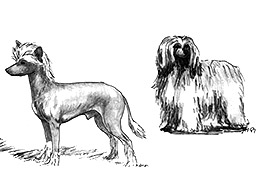Chinese Crested Dog Breed Standard
Last updated: 05 Aug 2009
A breed standard is the guideline which describes the ideal characteristics, temperament, and appearance of a breed and ensures that the breed is fit for function with soundness essential. Breeders and judges should at all times be mindful of features which could be detrimental in any way to the health, welfare or soundness of this breed.

Kennel Club, London 1994
Amended October 1995
FCI Standard No 288
-
Group:
Group 1 (Toys)
-
History:
-
General Appearance:
A small, active and graceful dog; medium to fine boned, smooth hairless body, with hair on feet, head and tail only; or covered with a soft veil of hair.
-
Characteristics:
Two distinct types of this breed; Deer type, racy and fine boned, and Cobby type, heavier in body and bone.
-
Temperament:
-
Head And Skull:
Slightly rounded and elongated skull. Cheeks cleanly chiselled, lean and flat, tapering into muzzle. Stop slightly pronounced but not extreme. Head smooth, without excess wrinkles. Distance from base of skull to stop equal to distance from stop to tip of nose. Muzzle tapering slightly but never pointed, lean without flews. Nose a prominent feature, narrow in keeping with muzzle. Any colour nose acceptable. Head presenting graceful appearance, with alert expression. Lips tight and thin; An ideal crest begins at the stop and tapers off down neck. Long and flowing crest preferred, but sparse acceptable.
-
Eyes:
So dark as to appear black. Little or no white showing. Medium size, almond in shape. Set wide apart.
-
Ears:
Set low: highest point of base of ear level with outside corner of eye. Large and erect, with or without fringe, except in Powder Puffs where drop ears are permissible.
-
Mouth:
Jaws strong, with perfect, regular scissor bite, i.e. the upper teeth closely overlapping the lower teeth and set square to the jaws.
-
Neck:
Lean, free from throatiness, long and sloping gracefully into strong shoulders. When moving, carried high and slightly arched.
-
Forequarters:
Shoulders clean, narrow and well laid back. Legs long and slender, set well under body. Elbows held close to body. Pasterns fine, strong, nearly vertical. Toes turned neither in nor out.
-
Body:
Medium to long. Supple. Chest rather broad and deep, not barrel-ribbed. Breast bone not prominent. Brisket extending to elbows; moderate tuck-up.
-
Hindquarters:
Rump well - rounded and muscular, loins taut, stifles firm and long, sweeping smoothly into the well let-down hock. Angulation of the rear limb must be such as to produce a level back. Hind-legs set wide apart.
-
Feet:
Hare-foot, narrow and long. Nails any colour, moderately long. Socks ideally confined to toes, but not extending above top of pastern. Feet turning neither in nor out.
-
Tail:
Set high, carried up or out when in motion. Long and tapering, fairly straight, not curled or twisted to either side, falling naturally when at rest. Plume long and flowing, confined to lower two-thirds of tail. Sparse plume acceptable.
-
Gait/Movement:
Long, flowing and elegant with good reach and plenty of drive.
-
Coat:
No large patches of hair anywhere on body. Skin fine grained, smooth, warm to the touch. In Powder Puffs coat consists of an undercoat with soft veil of long hair, veil coat a feature.
-
Colour:
Any colour or combination of colours.
-
Sizes:
Ideal height: Dogs 28-33 cm (11-13 ins) at withers
Bitches 23-30 cm (9-12 ins) at withers
Weight varies considerably, but should not be over 5.4 kg (12 lbs).
-
Faults:
Any departure from the foregoing points should be considered a fault and the seriousness with which the fault should be regarded should be in exact proportion to its degree and its effect upon the health and welfare of the dog.
-
Notes:
Male animals should have two apparently normal testicles fully descended into the scrotum.
 For owners
For owners
 Members
Members
 Dogs Australia is a not-for-profit organisation advocating for the preservation of purebred dogs through ethical breeding.
It champions the highest standard of animal welfare through education and fostering dog-loving communities.
Internationally recognised and established in 1958 as the Australian National Kennel Council (ANKC),
the organisation promotes responsible dog ownership; maintains the ORCHID* heritable canine diseases database;
funds research into canine diseases; and supports state and territory-based member bodies.
Dogs Australia promotes breed conformation shows and community sports for dogs that fulfil a breed’s natural instincts.
Dogs Australia is a not-for-profit organisation advocating for the preservation of purebred dogs through ethical breeding.
It champions the highest standard of animal welfare through education and fostering dog-loving communities.
Internationally recognised and established in 1958 as the Australian National Kennel Council (ANKC),
the organisation promotes responsible dog ownership; maintains the ORCHID* heritable canine diseases database;
funds research into canine diseases; and supports state and territory-based member bodies.
Dogs Australia promotes breed conformation shows and community sports for dogs that fulfil a breed’s natural instincts.







